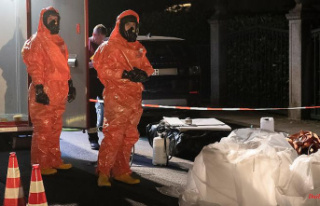The cause of the massive fish kills in the Oder has still not been clarified. In addition to possible contamination of the water with heavy metals, the atypically high salt content could also play a role. Meanwhile, the pollutants spread further to the Oderhaff.
According to Brandenburg's Environment Minister Axel Vogel, the Oder, which has been affected by mass fish deaths, has "very much increased salt loads". The term salt loads refers to salts dissolved in the water. That was "absolutely atypical," said the Green politician on Friday evening on RBB television. Vogel's ministry said the measured atypical salt loads could be related to the fish kill.
"According to current knowledge, however, it will not be a single factor that caused the fish kill in the Oder," says a statement. The ministry explained that these are the first further results from the Berlin-Brandenburg state laboratory on the daily samples that were taken at the automatic measuring station in Frankfurt (Oder) by Friday. The results are "not yet fully meaningful and not conclusive".
Further test data "in particular on heavy metals, mercury (in other samples) and other elements" are still in the laboratory for clarification and should be available in the coming week. "Today's data point to multi-causal relationships, which include the current very low discharge rates and high water temperatures."
With a view to possibly increased mercury levels, Vogel said that this would be checked further. It could be a local phenomenon. When asked whether groundwater or drinking water could be contaminated, Vogel replied: "We hope not." In any case, it was "a deadly cargo" that was transported in the river. But he would not go so far as to see the groundwater resources in danger.
The highly toxic substances could have reached the mouth of the Oder near Stettin as early as Friday evening. Depending on wind and current conditions, the pollutants could reach the Mecklenburg-Western Pomeranian part of the Oderhaff, the Kleine Haff, during Saturday, according to a statement published on Friday evening by the Mecklenburg-Western Pomeranian Ministry for the Environment. The ministry advises avoiding fishing and fishing and not taking any water from the Little Lagoon.
The mass death of fish in the Oder has triggered alarm in the border area with Poland. According to reports from Poland, the first indications of water pollution and dead fish near Olawa, about 25 kilometers southwest of Wroclaw, were already there towards the end of July. However, the authorities there only reacted this week when the situation worsened significantly and tons of dead fish were discovered on the Polish side of the Oder.












